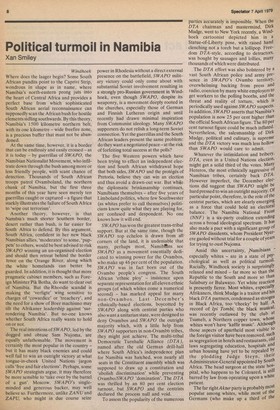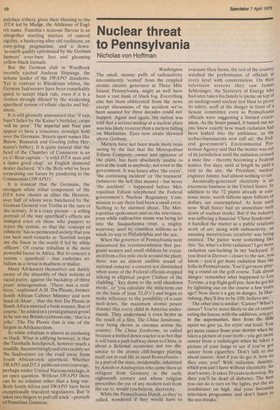Political turmoil in Namibia
Xan Smiley
Windhoek Where does the laager begin? Some South African pundits point to the Caprivi Strip, wondrous in shape as in name, where Namibia's north-eastern prong juts into the heart of Central Africa and provides a perfect base from which sophisticated South African aerial reconnaissance can supposedly scan the African bush for hostile elements sidling southwards. By this theory, Namibia's 1500 kilometre northern belt, with its one kilometre — wide freefire zone, is a precious buffer that must not be abandoned.
At the same time, however, it is a border that can be endlessly and easily crossed — as it is today — by guerrillas of SWAPO, the Namibian Nationalist Movement, who infiltrate down through the bush among more or less friendly people, with scant chance of detection. Thousands of South African troops patrol Ovamboland, the northern chunk of Namibia, but the first three months of this year have seen merely ten guerrillas caught or captured — a figure that starkly illustrates the failure of South Africa to 'wipe out terrorism'.
Another theory, however, is that Namibia's much shorter Southern border, desert rather than bush, is far easier for South Africa to defend. By this argument, South Africa, confident in her new black Namibian allies, 'moderates' to some, 'puppets' to others, would be best advised to risk SWAPO winning an un-organised election and should then retreat behind the border tence on the Orange River, along which the white homelands can better be guarded. In addition, it is thought that more pragmatic cabinet members, such as Foreign Minister Pik Botha, do want to clear out of Namibia. But the Rhoodie scandal is making the `verligte' wing sensitive to charges of 'cowardice' or 'treachery', and the need for a show of Boer machismo may tilt the Afrikaner leadership against 'surrendering Namibia'. But no-one knows whether South Africa really wants to hold on or not.
The real intentions of SWAPO, led by the dogged and obtuse Sam Nujoma, are equally unfathomable. The movement is certainly the most popular in the country — but it has many black enemies and could well fail to win an outright victory at what tongue-in-cheek United Nations jargon calls 'free and fair elections'. Perhaps, some SWAPO strategists argue, it may therefore be more sensible to 'take over by the barrel of a gun'. Moscow, SWAPO's singleminded and generous backer, may well believe so. Furthermore, unlike ZANU and ZAPU, who might in due course seize power in Rhodesia without a direct external presence on the battlefield, SWAPO milit ary victory could only come about with substantial Soviet involvement resulting in a strongly pro-Russian government in Windhoek, even though SWAPO, despite its weaponry, is a movement deeply rooted in the churches, especially those of German and Finnish Lutheran origin and until recently had drawn minimal inspiration from Communist ideology. Many SWAPO supporters do not relish a long-term Soviet connection. Yet the guerrillas and the South African leaders present the same problem: do they want a negotiated peace —at the risk of forfeiting total success at the polls?
The five Western powers which have been trying to effect an independent election and South African withdrawal hope that both sides, SWAPO and the proteges of Pretoria, believe they can win an election and thus avoid a drawn-out war. But whiie the diplomatic brinkmanship continues, Namibians themselves — after five years of Limboland politics, where few Southwester (as whites prefer to call themselves) politicians know quite what they are playing for, are confused and despondent. No one knows how it will end.
SWAPO has won the greatest trans-tribal support. But at the same time, though the SWAPO top echelon is drawn from all corners of the land, it is undeniable that many, perhaps most, Namibitns see SWAPO as a movement essentially dedicated to winning power for the Ovambos, who make up 46 per cent of the population. SWAPO was in fact born out of the Ovambo people's congress. The South African 'ethnic ploy' — insistence upon separate representation for all eleven ethnic groups (of which whites come a numerical second) — has marked appeal for many non-Ovambos. Last December's ethnically-based elections, boycotted by SWAPO along with centrist parties who also want a unitarian state, were designed to deny Ovambos and SWAPO the outright majority which, with a little help from SWAPO supporters in non-Ovambto tribes, they might just achieve. The multi-tribal Democratic Turnhalle Alliance (DTA), named after the old German drill-hall where South Africa's independence plan for Namibia was hatched, won nearly all seats in the Constituent assembly which was supposed to draw up a constitution and 'abolish discrimination' while preventing Ovambo/SWA PO 'domination'. The DTA was thrilled by an 80 per cent election turnout, but SWAPO and the centrists declared the process null and void.
To assess the popularity of the numerous parties accurately is impossible. When the DTA chairman and mastermind, Dirk Mudge, went to New York recently, a Windhoek cartoonist depicted him in a Statue-of-Liberty pose, with raised hand clenching not a torch but a lollipop. Freedom DTA-style, according to detractors, was bought by sausages and lollies, many thousands of which were distributed.
The DTA effort was also bolstered by a vast South African police and army presence in SWAPO's OVambo territory, overwhelming backing from press and radio, coercion by many white employers to get workers to the polling booths, and the threat and reality of torture, which is periodically used against SWAPO suspects. In addition, SWAPO asserts that Namibia's population is now 25 per cent higher than the official South African figure. The 80 per cent turnout figure could be much inflated. Nevertheless, the salesmanship of Dirk Mudge, political and culinary, is supreme and the DTA victory was much less hollow than SWAPO would care to admit.
Whatever the intimidation and bribery, DTA, even in a United Nations election, might get .a solid third of the votes. Many Hereros, the most ethnically aggressive Of Namibian tribes, certainly back DTA. However imperfect, the December elections did suggest that SWAPO might he hard pressed to win an outright majority. of particular point, therefore, is the role of the centrist parties, which are clearly emerging as a force that could hold an electoral balance. The Namibia National Front (NNF) is a six-party coalition extending across a broad ideological spectrum. It has also made a pact with a significant group Of SWAPO dissidents, whom President Nyer" ere gaoled without trial for a couple of years for trying to oust Nujoma.
Amid this uncertainty, ,Namibians especially whites — are in a state of psychological as well as political turmod. Racially, Windhoek society is surprisingly relaxed and mixed — far more so than the Republic to the South and more so than Salisbury or Bulawayo. Yet white reaction is presently fierce. Most whites, especially Afrikaners, think Mudge is a traitor and his black DTA partners, condemned as stoogeS in Black Africa, too 'cheeky' by half. A record of lpi Tombi, the black musical, was recently outlawed by the club at Tsumeb, a Northern copper town, whose whites won't have `kaffir music'. Although those aspects of apartheid most visible to the foreign visitor have been removed, such as segregation in hotels and restaurants, old laws segregating education, hospitals and urban housing have yet to be repealed by the plodding Judge Steyn, their Administrator-General appointed by South Africa. The head surgeon at the state hospital, who happens to be Coloured, is still barred by law from operating upon a white patient. The far right Aktur party is probably most popular among whites, while most of the Germans (who make up a third of the paleface tribes), gives their blessing to the DTA led by Mudge, the Afrikaner of English name. Namibia's teutonic flavour is an altogether startling ' mixture of ramrod rigidity, a hankering after old traditions, an easy-going pragmatism, and a downto-earth quality epitomised by the German farmers' ever-bare feet and gleaming yellow-black toenails.
But the German club in Windhoek recently ejected Andreas Shipanga, the urbane leader of the SWAPO dissidents. Yet in contrast to Rhodesian whites, the German Suidwesters have been remarkably quick to accept black rule, even if it is a version strongly diluted by the weakening apartheid system of ethnic checks and balances.
It is still gloomily announced that 'if rain hasn't fallen by the Kaiser's birthday, crops will be poor'. The imperial and Nazi past appear to have a tenacious, nostalgic hold over the Germans. Streets sport names like Bulow, Bismarck and Goering (after Hermann's father). It is quite natural that the head of the Chamber of Commerce is an ex-U-Boat captain — 'a solid DTA man and a damn good chap', an English diamond dealer declared. 'it's the Brits who've been torpedoing our future by pandering to the Communists (SWAPO)'.
It is ironical that the Germans, the strongest white tribal component of the DTA have chosen as allies the Hereros, over half of whom were butchered by the German General von Trotha at the turn of the century. It is a crazy picture — a telling portrait of the way apartheid's effects are stamped even on those who purport to reject the system, so that the 'concept of ethnicity' has so permeated society that you can hear such remarks as 'Scottish troops are the finest in the world if led by white officers'. Of course tribalism is the most powerful factor in Africa. But to concoct a system — apartheid — that enshrines tribalism as a virtue is madness or malice.
Many Afrikaners themselves are darkly aware of the absurdity of their notions of racial purity, against the backdrop of three years' miscegenation. 'There was a tradition,' explained A.H. Du Plessis, former South African Cabinet Minister and now head of Aktur , 'that the first Du Plessis in South Africa married a bush woman. But of course,' he added in a jovial guttural growl as he saw my British eyebrows rise, 'that is a joke'. The Du Plessis clan is one of the largest in Afrikanerdom.
So white tribalism is almost as confusing as black. What is edifying however, is that the Turnhalle hotchpotch, however much a muddle, has unwittingly and irrevocably set the Suidwesters on the road away from South African-style apartheid. Whether SWAPO and DTA paths can ever converge, perhaps under United Nations tutelage, is an open question. Without SWAPO there can be no solution other than a long war. Both South Africa and SWAPO have been exceptionally truculent negotiators. But 'it takes two fingers to pull off a tick' —proverb of Namibian Damaras.



































 Previous page
Previous page